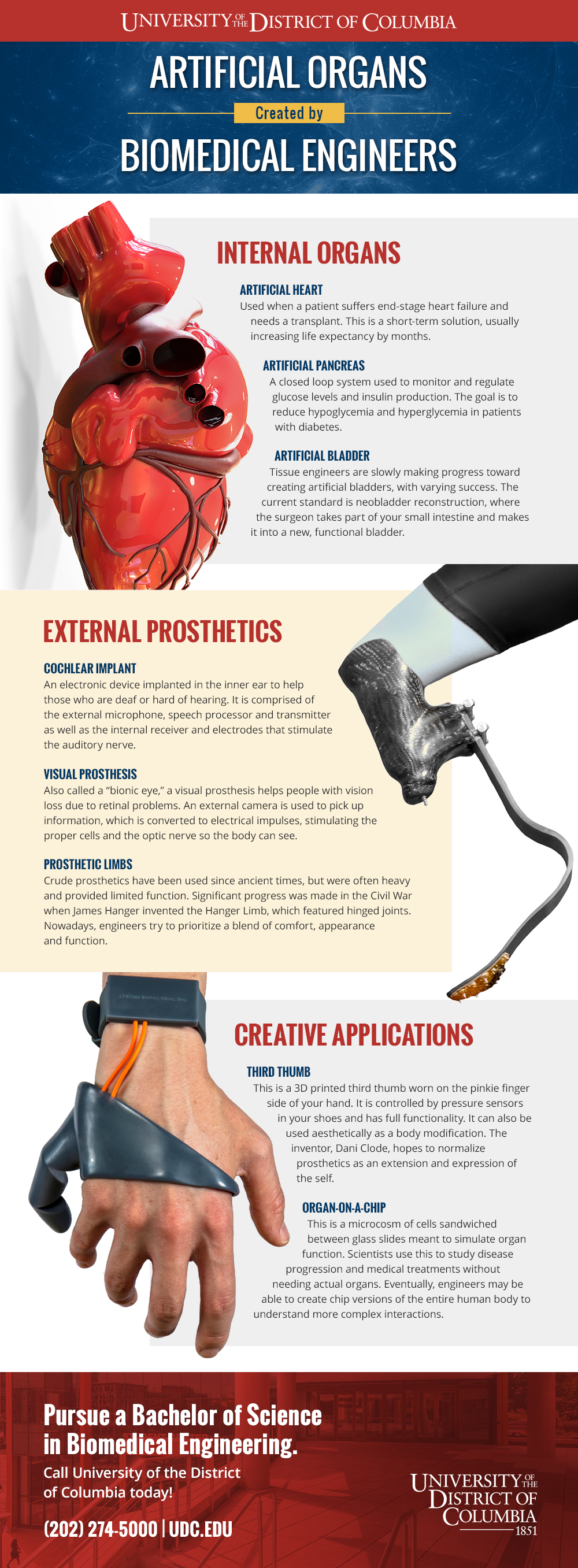Biomedical engineering is a field of study dedicated to the creation of medical devices, equipment, systems and software. It is the perfect blend of engineering, medicine and biology, requiring both building know-how and expertise in the science of the human body.
Simply put, biomedical engineers are the people who brainstorm, design and construct the tools doctors and nurses use on a daily basis. If you or a friend has ever needed the help of a medical device like an X-ray, implant, prosthetic or valve replacement, you have benefitted from biomedical engineering!
The Origins of Biomedical Engineering
Great minds have been practicing biomedical engineering in some shape or form since ancient times, although the inventions of old bear little resemblance to the high-tech solutions we have now. However, these earlier discoveries were unlikely to have been pioneered by “biomedical engineers” as we know them today. Biomedical engineering is still an interdisciplinary study that has only recently emerged as its own field, since it overlaps heavily with other science and engineering focuses. Thus, older inventions were likely to be discovered by inventors, doctors, thinkers or scientists.
Some interesting examples of older biomedical engineering inventions include:
- A wood and leather prosthetic toe found on an ancient Egyptian mummy
- The magnifying glass, invented in 1250 by Roger Bacon and later modified for eyeglasses and medical applications
- The flexible catheter, invented by Benjamin Franklin to help his brother, who had bladder stones and struggled with the original catheter’s rigid design
- The ear trumpet, a long, horn-shaped device held up to the ear which amplified sound before the invention of hearing aids
The Daily Life of a Biomedical Engineer
Because the field of biomedical engineering is so broad, each biomedical engineer can have a vastly different job. Some of the most common workplaces that utilize biomedical engineering graduates include:
- Research labs
- Hospitals
- Manufacturing companies
- Government agencies
Research labs provide a hands-on, academic approach, while hospitals need biomedical engineers to keep track of equipment performance and suggest improvements that could improve ease of use and efficiency. In a manufacturing company, biomedical engineers draw up designs for specific medical products. At a government agency, they establish safety testing and regulations.
People who graduate with a bachelor’s degree in biomedical engineering may also wish to complete a master’s or doctorate degree or prepare for medical school. With the proper amount of education, they can eventually become professors in their field of specialty.
Career Prospects for Biomedical Engineering
Now is an excellent time to pursue a career path in biomedical engineering, as people’s lifespans continue to lengthen, making further medical advances necessary. The US Bureau of Labor Statistics predicts the number of biomedical engineering jobs will grow 23 percent in the decade between 2014 and 2024.1 There are also excellent pay prospects and opportunities for career growth, with the May 2016 median salary sitting at $85,620.2
Start Your Biomedical Engineering Degree with the University of the District of Columbia (UDC)
Students who are passionate about healthcare, collaborate well with others, enjoy learning about anatomy and physiology, and love to tinker and create something new will be well-suited for this field. If you love scientific innovation and cutting-edge medicine, consider pursuing your Bachelor of Science in Biomedical Engineering from the University of the District of Columbia (UDC).
Out of the 107 historically black colleges and universities in the nation, we are proud to be one of only three who offer a B.S. in biomedical engineering. Besides offering comprehensive courses to prepare you for your future career, we also encourage students to participate in research at the Center for Biomechanical & Rehabilitation Engineering. Our campus is situated in a prime location for healthcare-related employment, ensuring students have access to many opportunities as soon as they graduate. Call us at 202-274-5000 for more information about our biomedical engineering program.
1https://www.bls.gov/ooh/architecture-and-engineering/biomedical-engineers.htm#tab-6
2 https://www.bls.gov/ooh/architecture-and-engineering/biomedical-engineers.htm#tab-5


